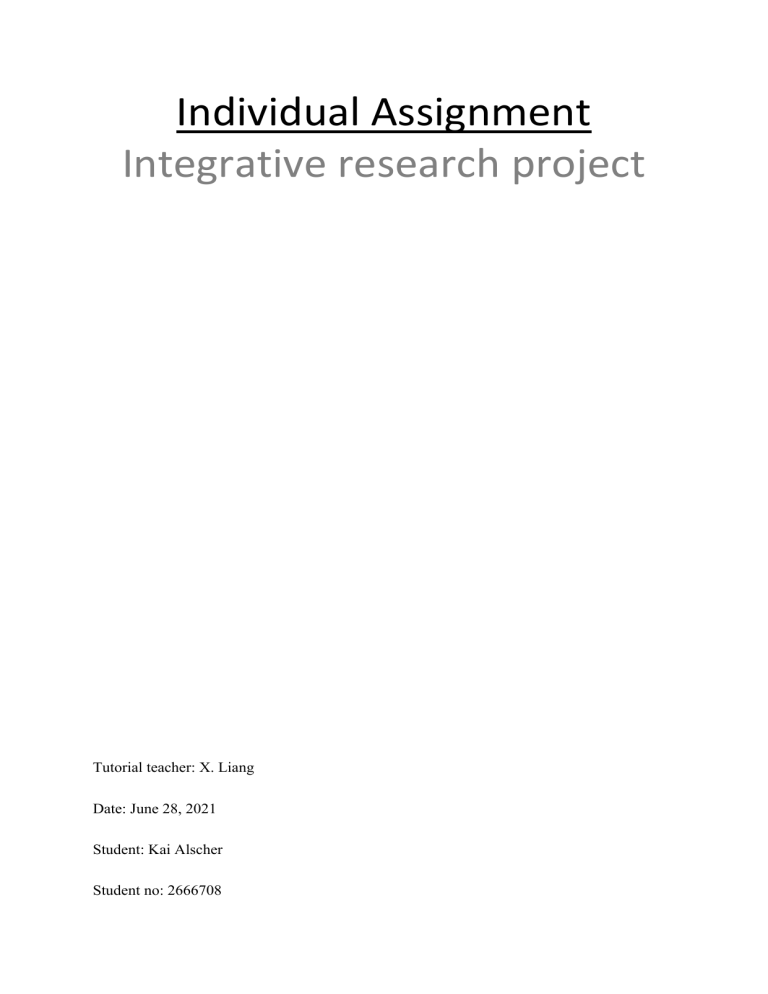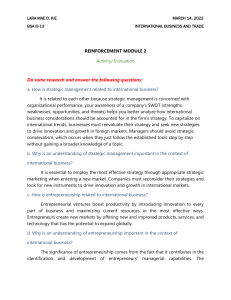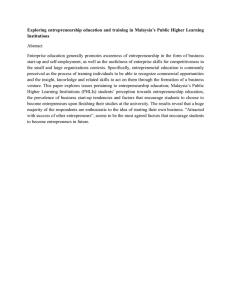
Individual Assignment Integrative research project Tutorial teacher: X. Liang Date: June 28, 2021 Student: Kai Alscher Student no: 2666708 Business challenge My team and I worked on the business challenge: Dark side of entrepreneurs. This challenge discussed how dark personality characteristic, such as narcissism and psychopathy are influencing entrepreneurs and how that can influence themselves and people around them. We decided to research whether entrepreneurial narcissism is negatively affecting the willingness to work of potential employees. Effects of narcissistic character traits can range from someone being more prune to gossip, to one showing more counterproductive behavior (Lyons & Hughes, 2015; Mahmood et al., 2021). Since there are almost 582 million entrepreneurs around the world and small businesses accounted for roughly 63,3% of all new jobs in the USA (in-between 1992 to 2013) it becomes evident how entrepreneurs and small businesses are a major part of today’s business world (Simovic, 2021). With millions of people being employed in such a setting it is from great importance to conduct deeper research into the negative sides and effects of entrepreneurship. It is important from a societal stance since stressed and exhausted employees tend to suffer from burnouts. In the USA 77% of employees indicated that they have felt burned out at work and that 83% of fulltime professionals indicate that personal relationships are negatively impacted by that (Fisher, 2020). Furthermore, the public health system and the state are predisposed to provide support for members of society if they become unable to work or are suffering from mental illnesses as for example depression. For businesses (either small or big) it is important to understand how their employees may be affected by certain character traits, because if (as in our research) the willingness to work of employees is low, their organizational citizenship behavior decreases (Hayashi et al., 2011) which in turn decreases effective organizational functioning and hence the whole organizations performance (Organ, 1988). Giving advice Our team has been asked to take on the consultant role and to investigate the dark side of entrepreneurs. We aimed for conducting a thorough and detailed research in order to provide the business, which has tasked us, with excellent information regarding their lack of knowledge about the topic. Based on this knowledge we aimed to provide the business with concrete advice. Bonaccio& Dalal (2005) defined advice as “a recommendation, from the advisor, favoring a particular decision” and providing the advised with clear guidance. Our consultancy team tried to assist entrepreneurs showing narcissistic character traits in recruiting and selecting the best fitting employees for their organizations. Hence, we formulated clear recommendations for a certain course of action for our clients. These recommendations will enable our clients to gain a deeper understanding of how their character traits affect their workforce and their willingness to work. And what kind of character traits as well as gender (e.g. Dominance/ Submissiveness) their potential employees should possess to increase(sustain) an effective organizational functioning. In order to provide our client with these recommendations our team took on the advisory role of “the devil’s advocate” since there were some severe issues inherited by our clients, which hindered their recruitment processes. Saxton (1995) describes devil advocates (also called provocateurs) as someone who is challenging the existing views and believes, while asking unanticipated and difficult questions. Our team decided on taking the devil’s advocate role since we informed our client about their flaws, which they most likely did not want to hear (Narcissists). We took it on us to measure and ask questions one might feel uncomfortable answering (when it comes to for example submissiveness) and then reporting the negative implications and results to our client. Cultural dependence of your business challenge Entrepreneurship differs across countries around the world. There is a Global Entrepreneurship index (GEI) which is measuring the climate a country creates for the development of businesses (Entrepreneurship & Business Statistics | GEDI, 2019). This index involves local circumstances such as the ease of doing business or how much support structures are implemented in the respective governmental or financial system. On this scale the US scores the highest whereas there is a large gap to the bottom of the list (Chad) and it is evident that there are huge gaps between entrepreneurship in different countries (Entrepreneurship & Business Statistics | GEDI, 2019). Researchers have found that cultural values effect the development of entrepreneurial behavior in society (Davidsson 1995, Thurik & Dejardin 2011) and that the difference in cultural dimensions such as power distribution, masculinity or individualism affect the way entrepreneurs conduct business. Especially masculinity has been found to have a positive impact on entrepreneurship (Hofstede et al. 2004). Nonetheless, entrepreneurs have one major thing in common, they are human and poses similar positive as well as negative personality traits. Hence employees in organizations around the world have similar probabilities to suffer under dark personality traits of entrepreneurs. And since entrepreneurs are not limited to a country, culture or organization the challenge we worked on could be universally/ globally applied. Of course, it has to be examined and slightly adapted to the local culture and climate. Hofstede Cultural Dimensions- China, Netherlands and USA Screenshot from: https://www.hofstede-insights.com For example, if you compare Netherlands and China, you see the difference of for example individualism. China is a highly collectivist country, where personal relationships are highly valued and are prevailing over task and company. Entrepreneurs are more inclined to care about personal relationships and hence dark personality traits have the potential to do interrupt business processes and organizational functioning than in the Netherlands. It would be interesting if future studies use culture as a moderating variable to deeply analyze the effect of culture on this business challenge Team dynamics We were a complete seven people team, and everyone was motivated to contribute to the success of our research project. Our group worked very dynamically, and we were able to meet all the deadlines. There was only one minor problem that occurred during the last 4 weeks. The problem our team ran into was that in the first week of the course one member of the group and me were on a fieldtrip and not able to contribute to the team’s work. Because of that the first buddy check had a rather poor result for the other person and me. With the buddycheck system the other team members were able to express their legitimate dissatisfaction. Luckily, there was good communication in our team and the problem could be resolved without conflict to the extent that in the end the team mutually agreed to opt out of the buddycheck system. From a helicopter perspective one might say that we “left our team behind” and were not able to be part in an important stage of the group’s development the forming stage in which roles are assigned and members get to know each other (Tuckman, 1965). This stage than further evolved in the storming phase (end of first week; beginning of second week), in which conflict can arise due to different working styles and team members having negative feeling since these are the ones, who are still hard working (Tuckman, 1965). This is essentially what happened in our group as well, but due to good communication we were able to resolve all problems. I learned two lessons for working in future teams; the first would be to not miss out on any of the group’s essential development stages to maintain a highly effective and maybe also fun working spirit in the team. And secondly, that good communication is essential for problems to be resolved. It allows people to express their perceptions, to voice out dissatisfaction and to ensure a mutual engagement to the team’s task. References: Bonaccio, S., & Dalal, R. S. (2006). Advice taking and decision-making: An integrative literature review, and implications for the organizational sciences. Organizational Behavior and Human Decision Processes, 101(2), 127–151. https://doi.org/10.1016/j.obhdp.2006.07.001 Davidsson, P. (1995). Culture, structure and regional levels of entrepreneurship. Entrepreneurship & Regional Development, 7(1), 41–62. https://doi.org/10.1080/08985629500000003 Entrepreneurship & Business Statistics | GEDI. (2019). The Global Entrepreneurship and Development Institute. https://thegedi.org/global-entrepreneurship-and-developmentindex/ Fisher, J. (2020, April 24). Workplace Burnout Survey. Deloitte United States. https://www2.deloitte.com/us/en/pages/about-deloitte/articles/burnout-survey.html Hayashi, T. , Odagiri, Y. , Ohya, Y. , Tanaka, K. & Shimomitsu, T. (2011). Organizational Justice, Willingness to Work, and Psychological Distress. Journal of Occupational and Environmental Medicine, 53(2), 174–181. doi: 10.1097/JOM.0b013e31820665cd Lyons, M. T., & Hughes, S. (2015). Malicious mouths? The Dark Triad and motivations for gossip. Personality and Individual Differences, 78, 1–4. https://doi.org/10.1016/j.paid.2015.01.009 Mahmood, Z., Alonazi, W. B., Baloch, M. A., & Lodhi, R. N. (2021). The dark triad and counterproductive work behaviours: A multiple mediation analysis. Economic ResearchEkonomska Istraživanja, 1–22. https://doi.org/10.1080/1331677x.2021.1874463 Organ, D. W. (1988). Organizational citizenship behavior: The good soldier syndrome. Lexington Books/DC Heath and Com. Noorderhaven, N., Thurik, R., Wennekers, S., & van Stel, A. (2004). The Role of Dissatisfaction and per Capita Income in Explaining Self–Employment across 15 European Countries. Entrepreneurship Theory and Practice, 28(5), 447–466. https://doi.org/10.1111/j.1540-6520.2004.00057.x Saxton, T. (1995). The impact of third parties on strategic decision making. Journal of Organizational Change Management, 8(3), 47–62. https://doi.org/10.1108/09534819510090150 Simovic, D. (2021, May 27). 39 Entrepreneur Statistics You Need To Know In 2021. SmallBizGenius. https://www.smallbizgenius.net/by-the-numbers/entrepreneurstatistics/#gref Thurik, R., & Dejardin, M. (2012). L’impact de la culture sur l’esprit d’entreprendre. Reflets et Perspectives de La Vie Économique, LI(2), 75. https://doi.org/10.3917/rpve.512.0075 Tuckman, B. W. (1965). Developmental sequence in small groups. Psychological Bulletin, 63(6), 384–399. https://doi.org/10.1037/h0022100






